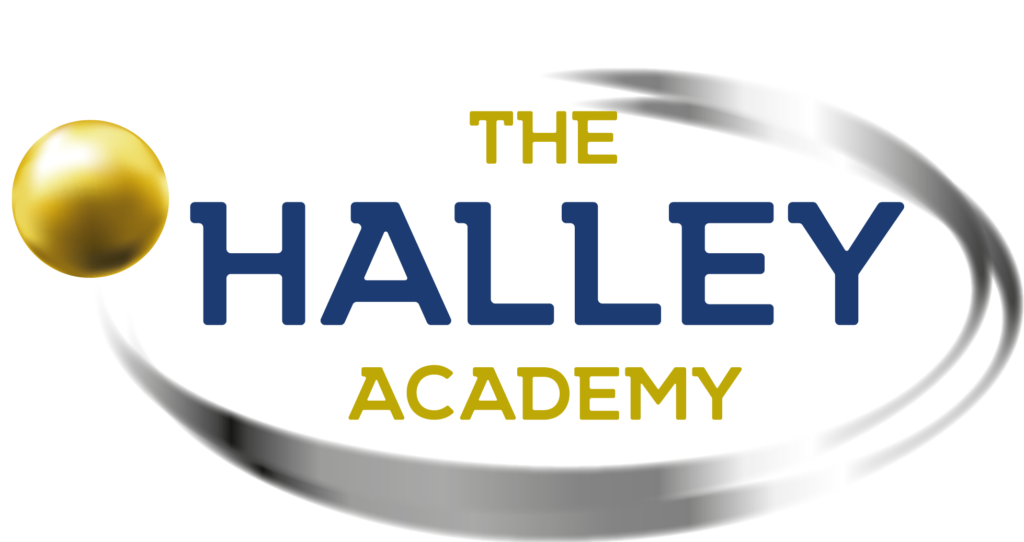“Literacy is a bridge from misery to hope. It is a tool for daily life in modern society . . . For everyone, everywhere, literacy is, along with education in general, a basic human right…. Literacy is the road to human progress and the means through which every man, woman and child can realise his or her full potential.” Kofi Annan
Literacy is an essential life skill for maximising our students’ academic achievement, employability, and life experiences. At The Halley Academy, every teacher is a teacher of Literacy. The Literacy curriculum aims to equip students with the knowledge, skills and experiences which will enable them to participate actively in the world around them. We strive to develop the whole person and broaden students’ horizons through building confidence and skill in manipulating the English language and its grammar in a variety of contexts.
Our Strategies for Supporting Literacy
Our approach to supporting literacy development covers whole academy strategies, large scale interventions, and small scale interventions. Our goal is to ensure that students are able to develop the core literacy skills required to successfully engage with the curriculum as a whole.
Pillars of Literacy:
To address the literacy needs of our students, we focus on six key strategies across the curriculum. These six pillars encompass strategies that are deemed the most essential to the supporting literacy in every subject:
- Know the Students – resources will be provided to staff to more easily identify their students and their literacy needs;
- Modelling Language – teachers modelling language in lessons, opportunities to talk with peers;
- Dual Coding/Visual Cues – the use of graphic organisers and images to support learning;
- Key Vocabulary – access to glossaries, identification of key words, word walls;
- Scaffolding Writing – sentence starters, substitution tables, whole text guides or proformas;
- Peer/Self Assessment – students need the tools to be able to find and correct errors in their own and others’ work.
Literacy Marking Codes:
All staff and students in the academy use universal marking codes when proofreading for literacy across all subjects. These codes were chosen in consultation with all faculties.
STAR Reading Whole Academy Testing:
All students in Year 7-11 will test their reading ages three times across a year to monitor and assess progress.
Reading and Cultural Festivals:
Every year the academy takes part in festivals and events that celebrate the importance of literacy and cultural diversity.
The Academy LRC (Learning Resource Centre)
Our LRC is the heart of the academy, as a centre for both developing literacy and improving research skills. Every student in Year 7-9 receives a lesson in the library once a week, and the library is open to all students during break, lunch, and after school.
The LRC collection is over 9000 books strong, with a range of both fiction and non-fiction texts. At the academy we place a large importance on the development of students’ first language, along with English, so we have a Foreign Language section with over 70 titles.
In addition to this, research by the National Literacy Trust has stated that one third of school age children do not see themselves in the books they read. This has led to a targeted expansion of books in our collection by BAME authors, who account for only 2% of published books in this country. We are also a Stonewall School and have recently created a section devoted to LGBTQ texts.
Additional Online Resources:
The following websites are a great starting point for additional literacy support in both reading writing, and listening skills:
Sparx Reader Vocabulary Programme:
The academy has a subscription to the Sparx Reader Vocabulary Programme which features a growing number of eBooks for students to read.
Zone In:
This fantastic website was created by the National Literacy Trust for students aged 13 and over. It includes workshops for reading writing, as well as speaking and listening, even a functional skills section for people aged over 16.
Learn English Teens:
A series of fun videos to help teens improve their reading, writing, speaking, listening, grammar, and vocabulary skills.
BBC Bitesize KS2 Grammar:
While the site may say it is for KS2, anyone can use these fun interactive games and quizzes to improve their spelling, punctuation, and grammar.
Top Marks:
A series of games to develop spelling and grammar, writing, reading, and poetry skills.
The Oak National Academy:
The Oak National Academy features several lessons in a range of subjects. In English KS3, there are several lessons in a section called ‘Recapping the Basics’ which focus on spelling, punctuation, sentence structure, and grammar.
Kids Read 2 Kids:
This site features videos of students reading to their peers. Often, it has abridged (shorter) versions of classic novels.
Lit2Go:
This website features the text of many classic novels and poems with accompanying audiobooks, which are free to listen to.
Project Gutenberg:
It’s a modest proposal: create an online eBook library of every out of copyright text in the world. Seems overwhelming, right? Well the folks at Project Gutenberg have set about creating just that, and have over 60,000 titles already available on their site. This also includes novels in foreign languages.
Audible Audiobooks:
This website features thousands of amazing audio books which can be narrowed down by age group or genre. Just click and start listening to a free 30 day trial.
TED Education:
TED Talks are known around the world as opportunities for experts to discuss their knowledge in an engaging talk that is then available on their website. TED Education is their website specifically for students and educators. Students can search or browse for content on any subject. It’s excellent for developing listening and comprehension skills.


